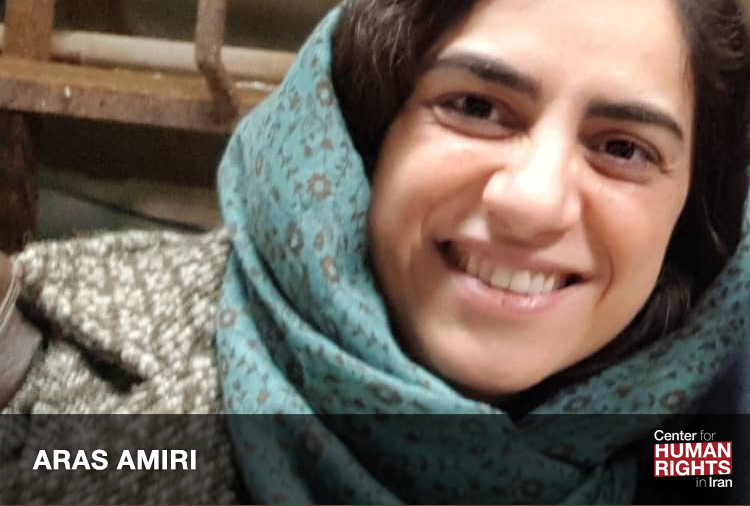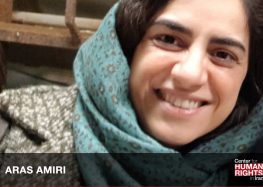Jailed British Council Employee Says She Rejected “Explicit Invitation” to Spy for Iran

- Aras Amiri is Serving a 10-Year Prison Sentence
- Says She Was Imprisoned for Association with British Council
- Was Not Allowed to Use Chosen Lawyer, Only Met Appointed Lawyer Once
- Calls on Chief Justice to Investigate “Unlawful Actions” in Case Processing
In a letter from Evin Prison, imprisoned British Council employee Aras Amiri wrote that she had refused to spy for Iran’s Intelligence Ministry months before she was sentenced to 10 years in prison under the false pretext that she had conducted espionage for the UK.
In the letter addressing Iranian Chief Justice Ebrahim Raisi, Amiri, an Iranian citizen who resided in the UK, also said she had been imprisoned on the basis of her association with the council as opposed to her actions, and called for an investigation into the judiciary’s “unlawful” processing of her case.
“Following my release on bail… the case investigators kept contacting me,” she wrote in the letter translated by the Center for Human Rights in Iran (CHRI). “During our third meeting, I turned down their explicit invitation for cooperation and told them I could only work in my specific field, not any other kind of work.”
“In light of the unlawful actions in the processing of my case and the insults against myself and my family, I am writing to request Your Excellency to carry out an investigation,” Amiri said.
The letter, dated June 11, 2019, was sent to CHRI by Amiri’s cousin, Mohsen Omrani, on July 14.
Amiri is among several detained Iranian citizens with foreign residences who’ve alleged they’ve been pressured to spy for Iran or face prolonged imprisonment.
In an undated letter from Evin Prison, Iranian-born Swedish citizen and scientist Ahmadreza Djalali, jailed in Tehran since 2016, also wrote that he was imprisoned for refusing to spy for Iran’s Intelligence Ministry.
His wife has stated that her husband was forced to rehearse and read a confession that was broadcast on state TV, and that his interrogators threatened him at the time that his family and children would be killed if he did not participate in the taped statement.
Amiri, a 33-year-old Iranian-born citizen and Kensington College of Business graduate student, lived in London where she worked for the British Council (BC) for five years as an artistic affairs officer before she was arrested on March 14, 2018, during a trip to visit her ailing grandmother in Iran.
She was released on bail in late May of that year and re-arrested some time between August 23 and September 22, 2018.
That time she remained in prison and was eventually sentenced to 10 years in prison in May 2019 under the charge of “forming and organizing a network for the purpose of overthrowing [the Islamic Republic of Iran],” she wrote in her letter.
Amiri: I Was Hired to Promote Cultural Understanding of Iran in the UK, Not the Other Way Around
In May 2019, after Amiri was sentenced, the British Council stated that her work was focused on building awareness about Iranian culture in the UK and that she had never traveled to Iran for work, as a judicial official had alleged.
“Aras has been employed for five years in London to help [build] greater appreciation of Iranian culture in the UK, for example supporting translations of Iranian books into English,” said Sir Ciaran Devane, chief executive of the British Council, on May 14.
“The British Council does not do any work in Iran and Aras did not travel to Iran for work, he added. “We will remain in close contact with the Foreign and Commonwealth Office.”
Devane was directly refuting Judiciary Spokesman Gholam-Hossein Esmaili’s statement made the day before.
Without mentioning Amiri by name, Esmaili told reporters in Tehran on May 13 that an Iranian student in London who “cooperated” with the UK’s intelligence service through the British Council’s cultural activities in Tehran had been sentenced based on her own “confessions.”
Iran’s security establishment has a documented history of extracting forced false “confessions” under actual or the threat of torture as well as imprisoning Iranian nationals with foreign ties and using them as negotiating chips with other nations.
“An Iranian individual in charge of the Iran desk at an English cultural organization known as the British Council cooperated with the British secret service to design and implement projects to adulterate and penetrate our culture,” Esmaili said.
Amiri strongly refuted Esmaili’s claims in her letter, pointing out that her arrest and imprisonment appear based on her association with the council rather than her actual actions.
“On the night of my arrest [March 14], I was told from the start that the reason for my arrest was my work for BC,” she wrote in her letter. “The interrogations were entirely focused on this matter and the case investigators noted that the problem was not me, but BC, which Iran wanted to stop operating in the country.”
Amiri wrote that presiding Judge Abolqasem Salavati—known for issuing harsh sentences against Iranian citizens with foreign residences including Iranian-British dual national Nazanin Zaghari-Ratcliffe—did not accept her elected lawyer and made her choose another who she was only allowed to meet with once.
She added that her sentence was announced on state-funded Iranian TV before she was informed of it:
“It was strange that the 10-year prison sentence against me was announced on national television before I returned from court to prison, without my lawyer’s knowledge. I could not believe I was represented as a person with ties with British intelligence services on a mission to carry out a cultural bloodbath!”
Amiri Cites “Unlawful Actions” in Case Processing
“On May 13, 2019, I was sentenced to 10 years in prison after nearly 10 and a half months in temporary detention, and three months after the last day of the trial on the charge of ‘forming and organizing a network for the purpose of overthrowing [the Islamic Republic of Iran]’ brought by the Ministry of Intelligence at Branch 15 of the Revolutionary Court in Tehran,” wrote Amiri.
“In light of unlawful actions in processing my case and the insults against myself and my family, I am writing to request that Your Excellency [Chief Justice Raisi] carry out an investigation,” she added.
Amiri identified the following four problems in her case:
First of all, how could the presentation of art be considered as evidence of my actions to overthrow the state and conduct espionage, as claimed by the judiciary’s spokesman?
Secondly, I was working for an official institution of the British government, which is not an [official] adversary [of Iran] and in fact has the highest level of diplomatic and economic relations with Iran. So how could I be accused of collaborating with the British intelligence agencies?
Third, based on what logic and proof was I infiltrating Iranian culture through the introduction of art? Some of the charges against me were not crimes at all and some of them were just ideas for art projects that were never carried out. It seems that the authorities in charge of this case were not interested in facts and never heard my defense, which indicates it is possible to make accusations without any sort of evidence.
Fourth, why on national television did the judiciary spokesman introduce me as ‘Aras Amiri Larijani’ and describe the visit to my family as a ’special mission’?
“As the head of the judicial branch and symbol of justice, you have a duty to prevent injustice,” she added, referring to Raisi.” Given the above points, I request an investigation to restore my rights and enforce justice.”
Amiri Explains Work History in the UK
Amiri refuted the allegations made against her by going into length about her work activities in the UK. Following is an excerpt of her letter translated by CHRI:
I have only been a citizen of my dear country, Iran. I am proud of the fact that I was raised in a family of art lovers. That love for the arts has always driven me to work in various aspects of this field all my life. I studied culture and art management at the Soore University in Tehran before moving to the UK in 2007 to continue my studies.
After completing my undergraduate studies in 2009, for five years I wrote reviews and translated books about visual arts in the UK. In 2013, I applied for a position advertised by the BC, which is a respected international cultural foundation, to be Iran’s artistic affairs [officer] at the British Council. I was hired after an interview and given the opportunity to earn a living in my own field and introduce my country’s art to the UK.
I do not have anything to hide, whether about the art programs I helped organize or my outlook toward art, culture and their issues in capitalist societies. During my initial interrogation from March 14, 2018, to May 21, 2018, and on the night before my release, the case investigators repeatedly said that my intention was to serve art and artists in my country and the dedication to my country was very clear and sincere.
On June 6, a few weeks after news of Amiri’s sentence became public, 21 members of the UK’s arts and culture community and academics wrote in an open letter that they were “dismayed” by the sentence and called for a new assessment of the charges.
“We request that the Iranian judiciary revises its decision,” said the signatories including Edinburgh international book festival director Nick Barley and Hay festival director Peter Florence.
“We ask that a more reasoned assessment of these charges and whatever is motivating them is dealt with through formal diplomatic channels without targeting Iranian citizens dedicated to the art of their country,” they added in the letter published by the Guardian newspaper.






